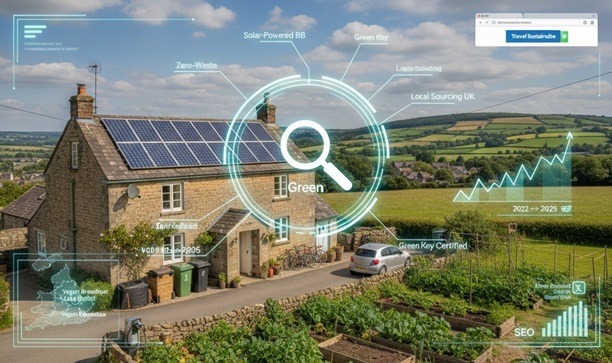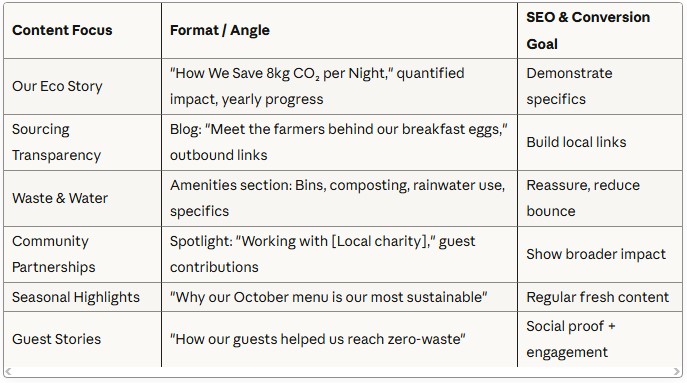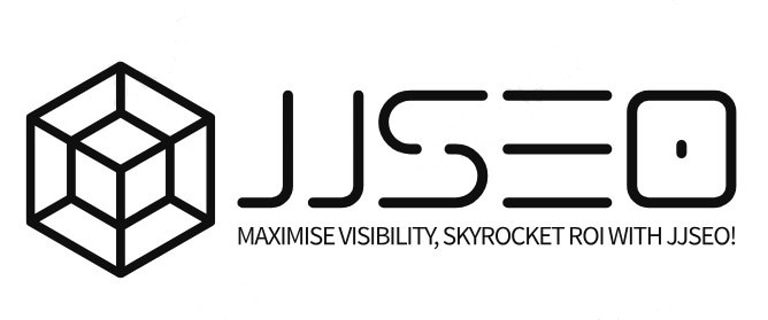Sustainability SEO for B&Bs: Your 2025 Booking Differentiator
Discover how Sustainability SEO transforms eco-friendly B&Bs into booking magnets. Learn the key green search keywords, schema tactics, and content strategies to attract high-intent, value-driven travelers in the UK.
SMES
Jorge Jaroslavsky
10/10/20259 min read


The Green Search: How Sustainability SEO is Becoming a Booking Differentiator for B&Bs
Sustainability is transforming from a vague buzzword into a powerful driver of consumer choice, with Bed & Breakfasts uniquely positioned to turn their authentic eco-friendly practices into measurable advantages both online and offline. As search behaviour shifts and Google increasingly rewards transparency and authority, "green search" is now a crucial SEO play – not merely a PR afterthought but a core booking engine for savvy B&B operators across the UK.
Why "Green Search" Matters in 2025
In recent years, eco-conscious travel has accelerated well beyond niche circles. Millennials and Gen Z especially are keen to align their spending with their values, seeking out sustainable stays that make genuine positive impacts – and, crucially, they research these credentials online before booking. According to Booking.com's 2024 Sustainable Travel Report, 75% of travellers want to travel more sustainably over the coming 12 months, with many willing to pay a premium for trusted eco-certification.
For UK B&Bs, with their on-the-ground local roots and manageable scale, this isn't just a marketing opportunity but a practical one. Where large hotel chains may struggle to truly deliver personal, low-impact experiences, independent operators can outshine by showcasing their sustainability with detail, transparency, and authority online. The right SEO strategy ensures their efforts aren't just worthy, but visible – and bring in higher-value, loyal bookings.
The UK market presents particular advantages here. British travellers have consistently shown stronger environmental concern than many international counterparts, and domestic tourism – which surged during and after the pandemic – has retained its focus on "staycations" with ethical credentials. Regional tourism boards from Visit Cornwall to Visit Scotland are actively promoting green stays, creating a supportive ecosystem for B&Bs willing to lead the charge.
Understanding the Green Search Landscape
The modern green traveller isn't simply looking for a place to stay – they're seeking validation that their accommodation choice aligns with their environmental values. This creates a fundamentally different search journey, one characterised by more specific, longer-tail queries and a willingness to dig deeper into a property's credentials before making a booking decision.
I've noticed in my work with hospitality clients that eco-focused search terms have grown substantially year-on-year since 2022, with particularly strong growth in hyper-local, specific combinations like "zero-waste B&B Cotswolds" or "vegan breakfast Lake District accommodation." These aren't casual browsers – they're high-intent bookers willing to pay premium rates for properties that genuinely deliver on sustainability promises.
1. Keywords: Shifting from Generic to Specific Intent
The green traveller doesn't use the same tired phrases as everyone else. High-value queries now centre on specifics – not just location or amenities, but authentic eco-features that reflect real-world choices.
Traditional vs Green Search – Understanding Intent
Eco-focused terms like "eco-friendly," "carbon-neutral," "low-waste," "sustainable," "certified green," and "locally sourced" are no longer fringe – they're central to how motivated guests search (and make choices) in 2025.
SEO Takeaway: Long-Tail, Authentic, Specific
Modern SEO for B&Bs must shift towards long-tail, high-intent phrases that combine conventional queries with sustainability proof-points. For example:
"Solar-powered B&B near York Minster"
"Green Key certified guesthouse in Yorkshire Dales"
"Zero-waste breakfast accommodation Leeds"
"Carbon-neutral B&B with EV charging Bath"
"Organic farm stay Herefordshire"
"Plastic-free accommodation Scottish Highlands"
These aren't just SEO targets – if reflected honestly in your offer, they become powerful conversion triggers for value-driven travellers. The key is ensuring that every term you target corresponds to a genuine, demonstrable aspect of your operation. (If you're just getting started with B&B SEO fundamentals, I've covered the broader strategy in my complete B&B SEO guide for 2025.)
Regional Considerations for UK B&Bs
The UK's diverse geography means sustainability keywords need regional tailoring. A coastal B&B in Cornwall might emphasise "marine conservation" or "ocean-friendly," whilst a Peak District property could focus on "rewilding" or "biodiversity." Urban B&Bs in cities like Manchester or Bristol might highlight "cycle-friendly," "public transport access," or "urban heat island mitigation."
Understanding your local environmental context – whether that's water scarcity in the South East, peat bog conservation in Scotland, or agricultural heritage in the Home Counties – allows you to develop keyword strategies that resonate both with search engines and with genuinely interested guests.
2. Technical SEO: Structured Data and the Rise of Sustainability Schema
What's under the hood of your website is as important as your text. Technical SEO can directly signal your eco-credentials to Google and boost the likelihood of rich results, badges, and direct visibility in local pack features.
Using Schema to Highlight Sustainability
Although there's currently no universal "sustainability" schema, B&Bs can still use structured data to emphasise eco-credentials:
LocalBusiness Schema: Implement on main and location pages, adding extra attributes for sustainable features via amenityFeature (e.g. "electric vehicle charging," "recycled toiletries," "on-site composting," "rainwater harvesting").
AboutPage Schema: On "Our Story" or Sustainability pages, mark up detailed information about eco-values, local sourcing, and any environmental awards.
Google Business Profile Integration: Google increasingly pulls verified eco-data, such as third-party Green Key or Green Tourism certifications, directly into Search and Maps listings if clearly marked on your site and GBP. Recent updates mean properties with recognised certifications are flagged with an eco-badge or "Eco-Certified" label in local results – prime real estate for winning click-throughs from value-driven searchers.
Futureproofing with Best Practices
Keep all location, amenities, and certification data up-to-date in GBP and on-site
Include sustainability credentials in image alt text and file names to help with image search and accessibility
Regularly check output in Google's Rich Results Tester and local search snippets to confirm details surface accurately
Ensure your website is itself sustainable – use efficient hosting, optimised images, and clean code to reduce digital carbon footprint (a growing ranking signal)
Page Speed and Green Hosting
There's a delicious irony in promoting sustainability on a bloated, slow-loading website hosted on carbon-intensive servers. Google's Core Web Vitals updates have made page speed a significant ranking factor, but beyond SEO, there's genuine environmental impact to consider.
UK-based green hosting providers like Kualo, GreenGeeks UK, or Krystal Hosting use renewable energy and carbon offsetting. Migrating to such a host isn't just ethically sound – it's a talking point you can use in content marketing ("Even our website runs on renewable energy"). Compress images using tools like ShortPixel or TinyPNG, implement lazy loading, and minimise unnecessary JavaScript to keep your site lean and fast.
3. Off-Site SEO: Building Green Trust Beyond Your Website
Google's algorithm rewards not only authority and accuracy on-site, but also off-site signals. For sustainability, this means cultivating links, citations, and trusted endorsements from respected eco-travel entities and local groups.
Niche Eco-Directories and Trust Signals
Being listed in reputable eco-travel directories delivers two-fold benefits:
High-quality, trusted backlinks that improve domain authority
Exposure to a highly targeted pool of value-driven guests, many of whom use these platforms as search engines in their own right
Key UK-Relevant Directories:
Green Tourism (the leading UK certification scheme)
Ecobnb
Responsible Travel
Green Key Global (with UK properties)
Sawday's Special Places (features sustainable properties)
The Good Hotel Guide (highlights eco-credentials)
Always verify that your Name, Address, and Phone (NAP) are consistent across directories to support local SEO. Inconsistent NAP data confuses Google and can hurt your local rankings significantly.
Leveraging OTA Eco-Filters
Mainstream platforms like Booking.com, Expedia, and TripAdvisor now offer "eco" or "Travel Sustainable" filters and badges. Even if the goal is direct bookings, qualifying for and displaying these status symbols on big OTAs validates your green claims in Google's eyes, as these platforms carry tremendous domain authority. They also provide an external, third-party check against greenwashing.
The Booking.com Travel Sustainable programme, for instance, requires meeting specific criteria across waste, energy, water, and community support. Achieving this badge not only gets you into filtered searches on the platform but also creates legitimate off-site validation that strengthens your overall SEO profile.
Local Press, Community Groups, and Backlinks
Perhaps more valuable than any generic directory link is a local, context-rich mention – for example, a press piece in a regional newspaper about your "plastic-free B&B," or a blogger documenting your biodiverse garden project. Partnerships with conservation groups, local farms, or even "Friends of the Lake District" amplify your footprint in ways Google loves: highly relevant, trust-laden backlinks based on authentic action.
Practical approaches I've seen work well include:
Hosting open days or workshops on sustainable hospitality for local businesses
Collaborating with local environmental charities (sponsor a tree-planting day, support a beach clean)
Contributing guest posts to regional tourism or sustainability blogs
Participating in local food festivals or farmers' markets
Partnering with nearby cycle hire shops, public transport initiatives, or conservation projects
Each of these creates natural opportunities for coverage, links, and citations that strengthen your SEO whilst genuinely contributing to your community's sustainability efforts.
4. Content Strategy: Authentic Storytelling vs Greenwashing
Today's informed traveller can spot vague or insincere "green" claims instantly. With so many businesses vying for eco-conscious custom, authenticity is the difference between bookings and bounce rates.
Content Ideas That Convert Green Searchers
Tactics for Authentic Content
Publish "Year in Review" sustainability impact updates, ideally with numbers and stories. Don't just say "we recycle" – say "we diverted 340kg from landfill in 2024 and composted 180kg of food waste."
Create "Sustainability FAQ" pages to answer common green guest concerns ("Do you use plastic toiletries?", "Is your heating from renewable sources?", "How do we get here without a car?").
Push for honest, case-study-style blog posts ("How we tackled food waste," "Our biggest eco mistakes and what we learned," "Why we can't be completely zero-waste yet – and what we're doing about it").
Always include direct mentions, links, and reviews by respected third-party sources or partners – these build lasting trust and help you rank.
Encourage guests to leave reviews specifically mentioning green features on Google, TripAdvisor, and booking platforms. Consider a subtle prompt in your departure information: "If our sustainability efforts enhanced your stay, we'd love to hear about it in a review."
Why Authenticity is Non-Negotiable
Greenwashing – over-claiming, misleading, or being vague about eco-steps – is not just unethical, but likely to backfire as reviews, local press, and watchdog sites get better at sniffing out the truth. Google itself now considers "sustainable claims" a red-flag tagging point for manual reviewers, particularly following updates to its helpful content guidelines.
The UK's Competition and Markets Authority (CMA) has published strict guidance on environmental claims, requiring them to be truthful, clear, and substantiated. For B&Bs, this means every claim on your website should be backed by evidence – certifications, supplier partnerships, energy bills, waste records, or guest feedback.
Moreover, the most successful green B&Bs online are those that share their journey, including challenges and failures. A blog post titled "Why We Couldn't Go Completely Plastic-Free (Yet)" can be more compelling than perfect-sounding platitudes, because it demonstrates honesty, problem-solving, and commitment. It also provides natural opportunities for regular content updates as you make progress – fuel for ongoing SEO.
Practical Steps for B&Bs: Turning Sustainability into Bookings
1. Audit and Document
Clearly list all eco-measures (big and small). Think energy use, products, waste, travel, partnerships, and food sourcing. Go beyond buzzwords: quantify efforts wherever possible. "We use renewable energy" becomes "We've installed 24 solar panels generating 4,800kWh annually, covering 85% of our electricity needs."
2. Integrate Keywords
Use high-intent green phrases throughout site copy, headers, meta titles, and alt text – aligned honestly with what you deliver. Map specific keywords to specific pages, and ensure your homepage, about page, and location pages all weave in sustainability naturally without keyword-stuffing.
3. Upgrade Technical SEO
Implement schema everywhere possible. Regularly test with Google's tools and keep GBP and directories up to date. If technical SEO feels overwhelming, consider working with someone who specialises in hospitality – the ROI from improved visibility can be substantial.
4. Earn Trust Off-Site
Approach relevant green directories, blogs, and local organisations for backlinks, reviews, or guest content. Build genuine relationships rather than just chasing links – quality trumps quantity in modern SEO.
5. Tell Real Stories
Blog about both triumphs and difficulties on the sustainability journey. Link to suppliers, local markets, or charities and invite two-way relationships (e.g. guest features, interviews, collaborative content). Make your staff part of the story – "Meet Sarah, our head housekeeper, who designed our zero-waste cleaning system."
A "Green Search" Checklist for Sustainable B&B SEO
Review and expand target keyword list to include at least 10–15 sustainability-focused long-tail terms
Publish or update a detailed "Our Green Story" and "Sustainability Policy" page with specific actions and results
Integrate LocalBusiness and AboutPage schema, using amenityFeature for eco-attributes where possible
Regularly check Google Business Profile for "eco-certified" badge, and re-submit documentation as needed
List in at least 3 trusted eco-travel directories with up-to-date NAP details
Secure 1–2 backlinks per quarter from regional press, environmental blogs, or community partners
Run twice-yearly content audits for authenticity, depth, and keyword targeting; remove vague or unsubstantiated claims
Invite reviews specifically highlighting green features, and showcase these on-site and in OTA listings
Ensure website hosting is with a green provider and site performance is optimised
Create a content calendar with at least one sustainability-focused piece per quarter
Final Thoughts: Sustainability Isn't a Slogan, It's an SEO Strategy
The convergence of digital search and genuine sustainability is only gaining pace. B&Bs rooted in transparency and community stand to win the greatest share of this new, loyalty-driven market. By matching technical, keyword, and content strategies with verifiable, human-scale action, green-focused B&Bs can transform their ethical stance into a search and booking edge that multi-national hotels simply cannot replicate.
The beauty of this approach is that it creates a virtuous circle: genuine sustainability efforts create compelling content, which drives search visibility, which attracts like-minded guests, whose positive reviews and word-of-mouth further strengthen your position. You're not gaming the system – you're being rewarded for doing the right thing in the right way.
For UK B&Bs, the timing couldn't be better. With domestic tourism strong, environmental consciousness high, and Google's algorithms increasingly sophisticated at rewarding authentic expertise, the stage is set for properties willing to lead with transparency and action rather than empty slogans.
Whether you're just starting to optimise your B&B's online presence or looking to refine an existing strategy, jjseo.co.uk offers insights and resources for hospitality businesses ready to take their digital marketing seriously. The search engines, the guests, and the planet will all benefit when sustainability and smart SEO work hand in hand. For further information, contact me to discuss your requirements.




Expertise
Driving organic traffic with tailored SEO solutions.
Growth
Results
Mail to: jj@jjseo.co.uk
© 2025 JJSEO. All rights reserved. | Expert SEO Consultant in Leeds
